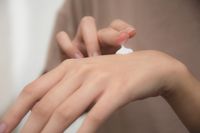are you considering adding lactic acid and retinol to your skincare routine? these two powerful ingredients can provide a range of benefits to your skin when used correctly. in this article, we'll explore whether it's safe to use lactic acid and retinol together and what precautions you need to take if you do.
what is lactic acid?
lactic acid is an alpha hydroxy acid (aha) derived from milk or other natural sources. it is a gentle chemical exfoliant that helps to remove dead skin cells and improve the appearance of the skin. the main benefits of using lactic acid include promoting collagen production, which can help to reduce fine lines and wrinkles, improving skin texture, and hydrating dry skin. lactic acid is also known for its ability to brighten the skin and reduce the appearance of hyperpigmentation.
what is retinol?
retinol is a vitamin a derivative that is commonly found in anti-aging skincare products. it is a powerful anti-aging ingredient that helps to speed up cell turnover, which can help to fade hyperpigmentation, treat and prevent acne, and improve the overall texture and tone of the skin. retinol can also be beneficial for acne-prone skin by unclogging pores and preventing future breakouts.
are lactic acid and retinol safe to use together?
lactic acid and retinol can be safely used together in the right amounts and with proper hydration and sun protection. some experts suggest that when used together, lactic acid can enhance the effects of retinol by increasing cell turnover and making retinol more effective. however, it's important to start slow and gradually increase the frequency of use to avoid potential irritation or sensitivity.
what happens if i use them together too frequently?
if you use lactic acid and retinol together too frequently, you may experience irritation, redness, or peeling. these side effects can be more pronounced if you have sensitive skin or if you are using other retinolic acid products. if you experience any of these signs, it may be necessary to decrease the frequency of use or to switch to alternative skincare products.
should you use retinol at night or in the morning?
retinol is more effective at night, as it can break down during the day and make the skin more susceptible to sunburn. for this reason, many people choose to use retinol at night. also, if you have sensitive skin or acne-prone skin, it may be best to use retinol at night to minimize any potential irritation.
what should you look for in a skincare product?
when selecting a skincare product that contains both lactic acid and retinol, look for a product with a time-release formula for retinol to minimize irritation and provide optimal effectiveness. additionally, opt for a moisturizing formula that contains hydrating ingredients like hyaluronic acid to help minimize any potential irritation or redness.
will using both lactic acid and retinol together cause skin irritation?
while it's generally safe to use lactic acid and retinol together, some individuals may experience irritation, particularly if they have dry or sensitive skin. if you notice any signs of irritation, such as redness, peeling, or sensitivity, it may be necessary to reduce the frequency of use or to try a different product.
how long does it take for lactic acid and retinol to work together?
you may begin to see some results within two weeks of using lactic acid and retinol together, but consistent use is typically required to see more significant improvements in skin texture and clarity.
how should you combine these ingredients?
to effectively combine lactic acid and retinol, start with a small amount of each product and use them separately, following the directions on the product label. gradually increase the frequency of use, paying close attention to how your skin responds.
what else should i consider when using lactic acid and retinol?
when using lactic acid and retinol, always use sunscreen daily to protect your skin from sun damage. also, consider incorporating other hydrating and nourishing ingredients into your routine, such as hyaluronic acid, niacinamide, or glycolic acid.
are there any other skincare ingredients you should avoid?
if you have sensitive skin, avoid using products with AHAs, BHAs, and retinoids on alternating nights to prevent over-exfoliation and damage to your skin barrier. additionally, be cautious when using potent skincare ingredients if you are pregnant or breastfeeding.
conclusion
using lactic acid and retinol together can provide a youthful, radiant complexion when used properly and with proper attention to your skin's needs. by adhering to these tips, you can enjoy the brightening and hydrating effects of these powerful ingredients without causing unnecessary irritation or sensitivity.









